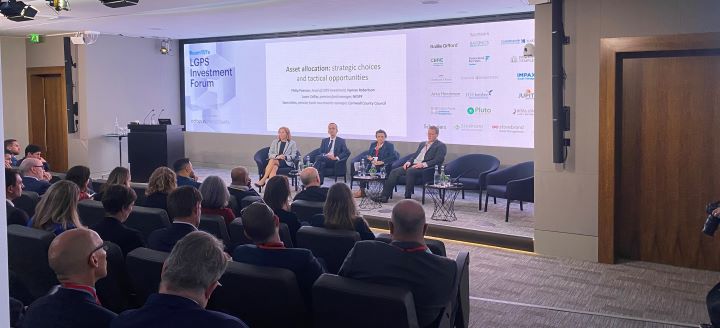
What do rising rates, persistent inflation and geopolitical tensions mean for the LGPS? Adapting to a rapidly changing macroeconomic environment and potential political transformation were the key themes at this year’s Room151 Investment Forum.
The one day event at the London Stock Exchange was kicked off by Aoifinn Devitt, chief investment officer at Moneta who drew attention to the drastic change investors were facing compared to last year, when UK investors were licking their wounds from the effects of the LDI crisis.
While the outlook now looked a lot better, Devitt still encouraged investors to be vigilant and interrogate their managers on how to respond to a new normal of rising rates and inflation.
This theme was picked up by Philip Pearson, head of LGPS Investment at Hyman Robertson, who outlined three key factors driving change in LGPS asset allocation. “De-risking and the desire to protect funding positions but there are lots of other factors, unfortunately some of them are pulling in different directions,” he highlighted.
Pearson made the case that required returns for schemes could still rise and that de-risking could reduce expected returns. Schemes will also have to rethink contribution rates and consider diversification levels, “we think that there is some further scope to go on diversification,” he added.
His outlook resonated with Laura Colliss pension fund manager at Aberdeen and North East Scotland. Derisking had been on the Scottish agenda for some time, with the Scottish funds being relatively better funded than their English and Welsh counterparts. But despite being between 125% and 130% funded, both LGPS funds are not considering drastic changes to their allocation for the time being.
“We are quite comfortable with our equity allocation [55%], for us being fully funded is more a question of reducing contribution rates,” she said whilst acknowledging that funding rates could still change.
In contrast, Sean Johns, pension fund investments manager at Cornwall County Council which is part of Brunel Pension Partnership, made the point that his fund had relatively recent experience with low funding levels, it is currently 96% funded.
“For us, the derisking journey is not quite there yet, we focused on looking at cash flow,” he stressed. As part of that, the fund has made a recent allocation to UK corporate credit, which he said offered good risk adjusted returns.
Johns echoes Collis’ point that funding levels could still change rapidly if gilt yields change and said that there was currently little appetite for de-risking.
IRA driving ‘global green transition’
The second panel discussion of the day on investing in sustainable infrastructure very much centred around the geopolitical outlook of renewable energy over the next 18 to 20 months.
Luke Webster, chief investment officer at the Greater London Authority, highlighted that he is interested to see whether the Inflation Reduction Act (IRA) in the United States is successful. If the act “routes renewable energy into the US” it could create a “global green transition”, which in turn will create “huge financial returns” for asset owners in the space, Webster told delegates.
However, he warned that if the IRA is not successful through a change in political administration it could make pension funds’ allocations in renewables “difficult to justify”, which is very much a concern for him.
Also on the panel was Paul Guilliotti, assistant director (financial services) at Richmond and Wandsworth Councils, who slightly countered Webster’s view by suggesting that a greater concern and risk for him is the UK government’s agenda of directing LGPS funds to allocate capital towards local investment and infrastructure.
Renewable returns
The panel discussion then turned to whether now is the right time for funds to allocate money towards sustainable infrastructure, with Gianfranco Saladino, head of infrastructure investments at Swiss Life Asset Managers, highlighting that returns are currently “very solid”, “we have maybe even got a higher return expectation, which has been driven by the rise in rates”.
Peter Bachmann, managing director at Gresham House, followed on from Saladino’s comments by telling delegates that sustainable infrastructure continues to create attractive returns, with some assets within its portfolio creating returns of “15-20%”.
‘Unappreciated gems’
In his keynote speech, Chris Hulatt, founder of the Octopus Group, highlighted that if he were to be chancellor for the day, he would promote “boosting entrepreneurs” as a way to accelerate growth in the UK economy.
Hulatt detailed the journey of the Octopus Group, which started from a room in his apartment to where it is today as a £13bn business that invests in venture capital and renewables. He stated that in the investment world, small companies seem to be “unappreciated gems”, which can offer pension funds great investment opportunities.
‘Paradigm shift’ in economic market
Piers Hillier, CIO at Royal London Asset Management, opened the discussion by warning that Central Banks might again be slow to respond to macroeconomic changes. Tacking the question whether rates have now peaked, he expressed caution: “About six months ago, we felt that we were at the peak but just as banks were too slow with quantitative tightening last year, they are now too reluctant to anticipate that change.”
“The Bank of England in fairness, have tempered their message more than others, my sense is that we may not have fully reached the peak but we are there or thereabouts. The thing that hasn’t happened yet, a lot of people expected a big blowout in spread and that corporates would go through the roof because we have seen the biggest move in interest rates in generations. That just hasn’t happened yet but it will happen, so brace yourselves, it is coming,” he warned.
Also on the panel was Andrew Parry, head of investments at J O Hambro, who outlined that the UK has experienced a “paradigm shift” in the economic market, with the country seeing a normal economic cycle of higher interest rates from a “very abnormal decade of behaviour”.
Coming off Parry’s point, Seth Meyer, head of fixed income strategy and portfolio manager at Janus Henderson Investors, highlighted that this economic environment has created a “bond pickers market”.
He also stated that due to this environment, pension funds should be “leaning” into yields. “I think right now we’re being given the opportunity to lean into yields that we haven’t seen in two decades,” Meyer added.
Inflation impacts on returns
However, shifting the discussion to more negative impacts of the current economic environment, Peter Wallach director of pensions at Merseyside Pension Fund, highlighted that pension funds should be sceptical that their funding ratios could change as a result of inflation.
He told delegates: “For an LGPS fund inflation is a real issue for us. The reality is that inflation is baked into our liabilities, whereas almost flippantly interest rates don’t really matter.
“I think one challenge for us in the LGPS is that yields have shifted, which has had an impact on bonds, but have we seen a similar shift in equities? So, when actuaries turn around and say our return assumptions are higher going forward, I think we should be slightly sceptical about that.”
Winds of change
The sense that the LGPS might be on the brink of some significant changes to its makeup and investment strategy was also reflected in the first LGPS survey, conducted jointly by Schroders and Room 151.
Survey responses reveal a shift from listed equities towards private markets,with most schemes now fully funded, 56 of respondents said they plan to reduce their equity exposure. In turn, 54% expressed an interest in private debt/lending strategies.
The survey also showed a continued interest in the climate transition, with more than half, 59% of respondents suggesting that they want to invest more in climate and natural capital solutions.
Presenting the findings at Room151’s annual Investment Forum, Paul Myles, private assets director at Schroders said: “We have talked a lot about reducing risk but our survey shows that there is a huge desire to increase private asset allocation, I also think that demand for natural capital solutions will increase.”
—————
FREE weekly newsletters
Subscribe to Room151 Newsletters
Follow us on LinkedIn
Follow us here
Monthly Online Treasury Briefing
Sign up here with a .gov.uk email address
Room151 Webinars
Visit the Room151 channel








